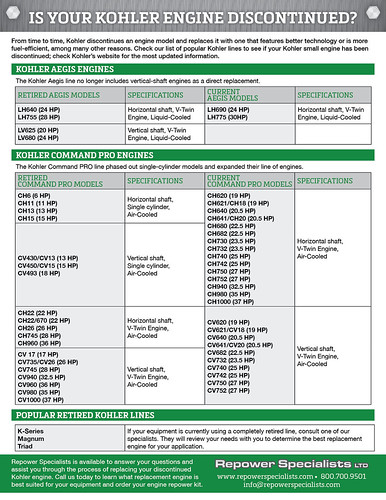When searching for a replacement for your Kohler engine, you find that your old engine has been discontinued. What to do? Discontinued Kohler engines may be replaced with compatible new models. Here are the important specs to consider when switching out a discontinued Kohler model.
Given the long Kohler company history, it is no surprise that some of their products have been discontinued. After more than a century of cast iron part and bath fixture manufacturing, Kohler produced its first electrical generator in 1920. In 1939, the company began work on its first liquid-cooled diesel engines. Their first small engines factory opened in 1948; it produced single-cylinder cast iron engines. Kohler small engines sales were strong in Thailand and Vietnam throughout the 1950s. At that time, nearly all air-cooled engines in Southeast Asia carried the Kohler brand. It was not until the 1960s that sales of Kohler small engines grew in the U.S. Today, garden tractors, construction equipment, lawnmowers, and snowmobiles are powered with Kohler engines. Over the years, generations of Kohler small engines have come and gone.
Fortunately, the company has retained enough common design features to allow replacement of older Kohler models. Here is what you should know about repowering discontinued Kohler engines.
Replacing Discontinued Kohler Engines: Key Specs
Engine Identification Numbers. When speaking with your Kohler engine dealer, you will need to know the old engine model, specification, and serial number. This information is displayed on a silver decal which is typically located on the blower housing.
Torque and Horsepower. Kohler generally rates the power of its engines with horsepower. If you only have the torque rating on hand, you can convert it to horsepower by multiplying the RPMs by its torque rating, and then dividing the result by 5,250.
As you figure out what horsepower rating you need, be aware that the rating system has changed over time. Prior to 1972, manufacturers advertised gross horsepower (SAE J1995), which describes the engine power with no accessories, mufflers, ignition timing, and under ideal operating conditions. In contrast, net horsepower (SAE J1349) includes accessory draws on an engine, such as ignition timing, exhaust systems, fuel injection, and so forth. As it describes a bare engine with no lost power, gross horsepower is always higher than net horsepower. When checking the horsepower of your original engine against replacement Kohler models, work with net horsepower, according to SAE J1940 specifications.
The Kohler Product Matrix webpage displays specifications for old and new engines. At that site, you can see SAE J1940 horsepower ratings for current models. Specs for discontinued models are also stated in owners manuals.
Work Cycle. The replacement engine should have the same number of cylinders and the same cylinder orientation as the old engine. So, if the old engine was a V-twin, the replacement model must also be a V-twin.
Engine Dimensions. The physical dimensions of old and new engines must match. Check that crankshaft orientation, mounting specs, and engine size will be compatible.
Fuel and Lubrication Type. Your new engine must match the lubrication and fuel of the old engine. A discontinued gasoline-powered engine must be replaced with a new gasoline-powered counterpart. The same rule of thumb applies to oil; the same type of oil must be used in the old and new engines.
Cooling System Type. Kohler manufactures both air-cooled and liquid-cooled engines. Make sure your replacement engine has the same type of cooling system as the discontinued engine.
Uses. How will you use the new engine? For lawn and garden work? Industrial construction? Beyond these categories, Kohler designs engines specifically for agriculture, golf course maintenance, power generation/welders, professional landscaping, and recreation. Each Kohler engine has specialized parts for its intended purpose. For instance, agricultural engines have more robust air filters, as dusty working conditions would otherwise cause clogs. Check that the replacement engine fits into the same application category as its predecessor.
If you need assistance in selecting a replacement for your discontinued Kohler engine, give us a call. Here at Repower Specialists, our staff has decades of experience in replacing engines. We can recommend a replacement Kohler engine that will fit and perform at its best. Call us today, we are here to help!

